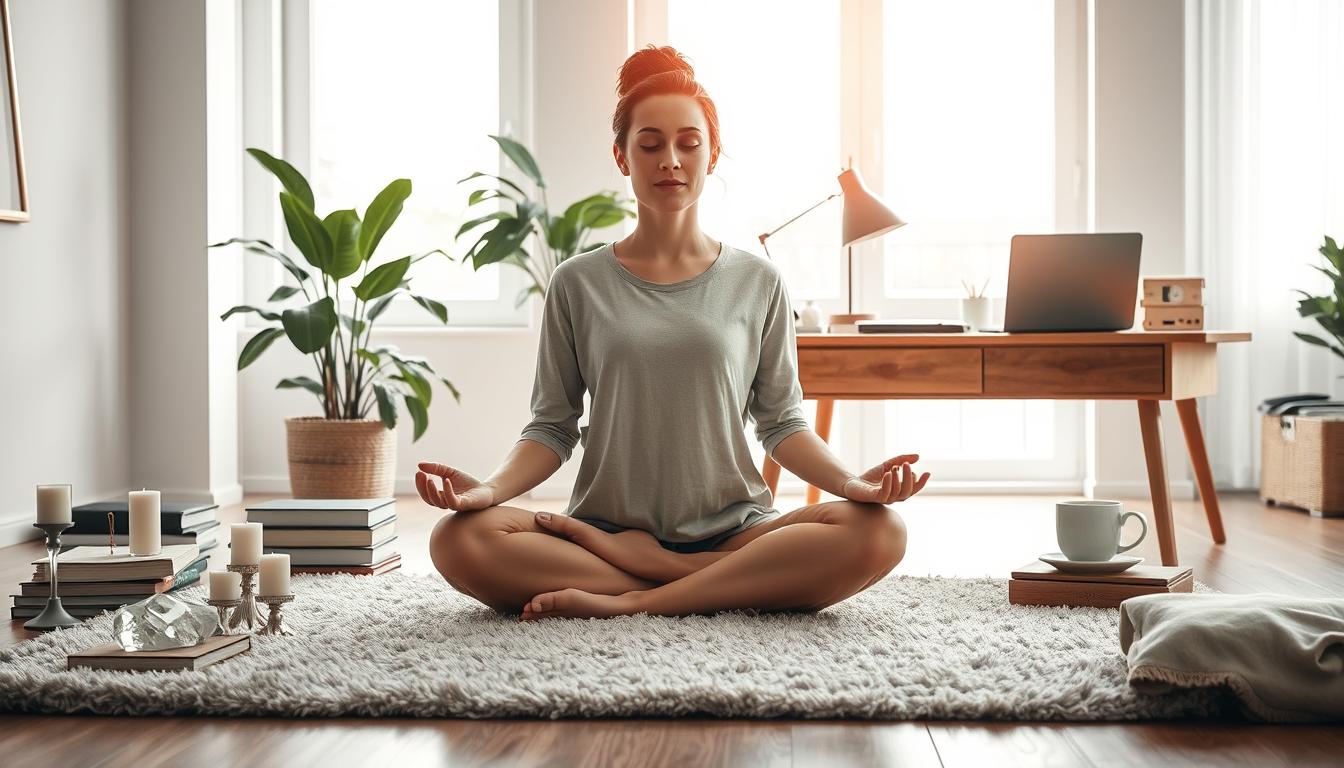Ever felt like your brain is full of endless thoughts and worries? Mental clutter can be overwhelming, taking away your peace and productivity. Research shows 84,356 people face mental overwhelm daily, looking for ways to clear their minds.
In today’s world, our minds are like cluttered workspaces that need organization. Decluttering your mind is not just a trend—it’s essential for your mental health and performance. Imagine turning your mind into a calm, efficient space.
This guide will show you 10 effective ways to declutter your mind. You’ll learn how to clear mental noise, reduce stress, and improve focus. Each method is aimed at creating mental space, enhancing focus, and finding inner peace.
Stress and mental clutter affect more than just your mood. They can drain your energy, lower productivity, and harm your health in the long run. By using these mental decluttering methods, you’ll become more focused and resilient.
Are you ready to escape mental chaos and find a clear, purposeful mindset? Let’s explore the world of mental organization and clarity together.
Understanding Mental Clutter and Its Impact on Well-being
Mental clutter can quietly ruin your day, making it hard to be productive and grow. It’s key to know how these mental hurdles form. This knowledge helps you use mental organization tips to clear your mind.
Signs of Mental Overwhelm
Spotting mental clutter early can stop its harm. Look out for these signs:
- Constant feelings of stress and anxiety
- Difficulty concentrating on tasks
- Persistent procrastination
- Reduced decision-making capabilities
- Emotional exhaustion
The Science Behind Mental Clutter
Research shows how mental clutter affects us. Cluttered spaces can raise cortisol levels by up to 30%. This boosts stress and hampers thinking.
How Mental Clutter Affects Daily Performance
Mental clutter doesn’t just make you uncomfortable. It also cuts down your performance. People with a lot of mental disorganization might see their productivity fall by nearly 50%. This happens because of:
- Increased distractions
- Reduced focus
- Higher mental fatigue
- Impaired decision-making skills
Knowing these facts helps you find ways to clear your mind. This way, you can get back your mental sharpness.
The Power of Mindfulness in Mental Decluttering
Mental clutter can feel like a heavy burden. Mindfulness offers a powerful solution to clear your mind. It helps you observe your thoughts without judgment, leading to mental peace.
Understanding your mind is key to decluttering. Cluttered environments raise cortisol levels, causing anxiety and reduced focus. Mindfulness helps break this cycle.
- Practice daily meditation for 10-15 minutes
- Use breathing techniques to center your thoughts
- Develop non-judgmental awareness of your mental patterns
- Create mental space by letting go of unnecessary thoughts
Mindfulness offers more than just calm moments. Studies show it can:
- Reduce stress levels
- Improve emotional regulation
- Enhance overall mental clarity
- Boost cognitive performance
“Mindfulness is not about perfection, but about being present in the moment.”
Start your mental decluttering journey with small steps. Spend a few minutes each day on mindful breathing or meditation. Over time, you’ll become more resilient and focused, changing how you think and interact with the world.
Mental Decluttering Techniques for Daily Practice
Clearing your mental space is key for staying productive and feeling good. With 75% of people feeling overwhelmed every day, using good mental decluttering methods can change your mind and improve how you do things.
Mental clarity exercises are great for taking back control of your thoughts and lowering stress. Studies show they can make you focus better by up to 40% and cut down anxiety a lot.
Brain Dumping Method
The brain dumping technique is a simple yet effective way to clear your mind. Here’s how to do it right:
- Grab a notebook or digital device
- Write down all thoughts without judgment
- Set a timer for 10-15 minutes
- Review and categorize your thoughts
- Create actionable steps from your brain dump
Digital Detox Strategies
It’s important to manage digital info overload for clear thinking. 68% of professionals say managing their inbox well makes them more productive. Here are some digital detox tips:
- Set specific email checking times
- Use app blockers during focused work
- Create device-free zones at home
- Unsubscribe from unnecessary newsletters
Mindful Breathing Exercises
Breathing exercises are quick ways to clear your mind. Studies show mindfulness can cut anxiety by up to 30%. Try this easy method:
- Sit comfortably with a straight spine
- Inhale deeply for 4 counts
- Hold breath for 4 counts
- Exhale slowly for 6 counts
- Repeat 5-10 times
By adding these mental decluttering methods to your daily life, you can boost your thinking, lower stress, and feel better overall.
Creating Systems for Mental Organization

Building strong mental organization tips can change your life for the better. Princeton University found that clutter makes our brains work harder. This increases stress and lowers focus. To find peace of mind, we need to create systems that organize our thoughts and tasks.
Digital tools are great for organizing your mind. Here are some tips:
- Use note-taking apps that sync to the cloud
- Try AI-powered task management platforms
- Make digital calendars with reminders
- Track your productivity with apps
Your mental organization system should fit you and change as needed. The University of Connecticut says that cleaning up clutter lowers stress and boosts happiness.
| Organization Tool | Primary Benefit | Recommended Usage |
|---|---|---|
| Digital Notebooks | Centralized Information | Daily Brain Dumping |
| Task Management Apps | Priority Tracking | Weekly Goal Setting |
| Cloud Storage | Document Organization | Monthly File Review |
Remember, the goal is not perfection but consistent progress in managing mental clutter. By using these tips, you’ll make your mind more organized and peaceful. This will help your overall well-being.
Habit Formation for a Clutter-Free Mind
Changing your mind takes more than just hoping for it. Mental decluttering techniques are key to clearing your mind and building lasting habits for your well-being.
Creating mental habits is a smart process. It involves understanding how our brain makes and keeps new patterns. Studies show that regular practice can change our brain’s connections, making habits easier to form.
Building Sustainable Mental Habits
To make lasting mental habits, you need a clear plan. Here are some important steps:
- Start with small, easy changes
- Set clear, achievable goals
- Keep track of your progress regularly
- Be kind to yourself when you slip up
Time-Boxing Techniques
Time-boxing changes your daily life by making tasks into set times. This method helps you stay focused and avoid feeling overwhelmed.
| Time-Boxing Strategy | Benefit |
|---|---|
| 30-minute work blocks | Improved focus |
| 15-minute break intervals | Mental refresh |
| Daily priority scheduling | Less decision fatigue |
Progress Tracking Methods
Keeping an eye on your mental decluttering journey boosts your motivation. Visualization techniques and regular self-reflection can greatly help your progress.
Remember, getting your mind clear is a skill that gets better with practice. Stay patient and dedicated to your personal growth.
Physical Space Organization for Mental Clarity
Your surroundings greatly affect your mental state. A messy area can make you feel stressed and less productive. Studies reveal that people spend up to 55 minutes daily looking for lost items. This shows how vital it is to keep your living and work areas tidy.
To clear your mind, start by organizing your space. This means creating a place that helps your mental health and boosts your work. It’s the first step in mental clarity exercises.
- Remove unnecessary items from your workspace
- Create dedicated zones for different activities
- Implement smart storage solutions
- Maintain a daily 10-minute organizing routine
Having a neat space can really help. Research shows it can make you up to 30% more focused and productive. The KonMari Method teaches to keep only what sparks joy. This approach can make your space feel more personal and emotionally uplifting.
An organized environment is a pathway to a clear mind.
Digital decluttering is also key. Here are some tips for your digital space:
- Unsubscribe from unnecessary email lists
- Organize digital files into clear folders
- Set specific times for checking notifications
- Delete apps that don’t serve your mental well-being
By organizing both your physical and digital spaces, you’re doing more than cleaning. You’re creating a mental haven that supports your well-being and productivity.
Simplifying Decision-Making Processes
Mental clutter often comes from too many choices that use up your brain power. Learning to make choices easier can change your life for the better.
Today, we check our phones over 100 times a day. This makes it hard to make decisions without getting tired. Cutting down on choices can make you feel clearer and more productive.
Priority Setting Framework
Having a good plan for what’s important helps you stay focused. Here are some tips for better decision-making:
- Check each choice against your core values
- Use the “Hell Yeah or No” rule: If you don’t feel excited, say no
- Make fewer decisions each day to save brain power
Decision Fatigue Prevention
A 2022 Ipsos survey found that almost 60% of people feel too much stress. To avoid decision fatigue, try these strategies:
- Start your day with a routine to avoid early decisions
- Group similar choices together
- Know your limits and set boundaries
Effective Choice Management
Decluttering your mind doesn’t mean you can’t make choices. It’s about making smart, simple decisions that fit your goals and clear your mind.
When in doubt, choose less complexity and more clarity.
By using these tips, you can make decisions that feel empowering, not overwhelming. This will give you more mental space and less stress every day.
Maintaining Long-term Mental Clarity

Decluttering for peace of mind is a journey that never ends. It needs your constant attention and purposeful actions. Your mind is like a garden that needs care and attention every day.
Building a mental clarity toolkit is key to managing mental clutter. This toolkit should have exercises that help you clear your mind and stay focused.
- Practice daily mindfulness meditation for 5-10 minutes
- Implement digital detox periods weekly
- Develop a consistent sleep routine
- Engage in regular physical exercise
Studies show that regular mental decluttering boosts your brain power. A 2023 study found that specific exercises can lower stress and improve your well-being.
Keeping your mind clear is a journey, not a goal. Be flexible and kind to yourself as you find what works for you. Remember, it’s the small, consistent efforts that matter, not perfection.
Mental clarity is not a destination, but a continuous journey of self-understanding and intentional living.
For lasting mental clarity, limit your screen time, practice mindfulness, eat well, and set boundaries. Adding these habits to your daily life will help you maintain mental clarity over time.
Conclusion: Embracing a Decluttered Mind for Enhanced Well-being
Your journey to declutter your mind is more than just organizing. It’s a path to better personal wellness. Studies show that 70% of people feel less stressed and more productive with a clear mind.
By using the strategies from this article, you can reduce mental chaos. This leads to a more focused and peaceful life. Mental decluttering is not just temporary relief. It’s a lasting way to manage stress and boost productivity.
Remember, mental clarity is an ongoing journey. Start with small steps and be patient. Your mind is powerful, and these techniques can unlock your potential for growth and better decision-making.
Embrace this journey, and watch your mind become more organized and peaceful. Your future self will thank you for the mental clarity you’re creating today.
FAQ
What exactly is mental clutter?
How does mental clutter impact my daily life?
Can mindfulness really help me declutter my mind?
How often should I practice mental decluttering techniques?
What are some quick mental decluttering exercises I can do?
Can physical decluttering really improve mental clarity?
How do I know if I need to declutter my mind?
Are digital tools helpful for mental organization?
How long does it take to see results from mental decluttering?
Can mental decluttering help with anxiety and stress?
Source Links
- How Decluttering Helps Bipolar Symptoms — and 10 Ways to Start | bpHope.com – https://www.bphope.com/bipolar-buzz/10-ways-to-clear-the-clutter-and-remove-bipolar-stress/
- 9 Tips to Declutter Your Mind and Space Before the New Year – https://daybreakwithray.com/9-tips-to-declutter-your-mind-and-space-before-the-new-year/
- The Impact of Clutter on Well-being – https://www.grandrisingbehavioralhealth.com/blog/the-impact-of-clutter-on-mental-well-being
- Mental Health Benefits of Cleaning and Decluttering – https://www.verywellmind.com/how-mental-health-and-cleaning-are-connected-5097496
- Here’s how your clutter may be affecting your mental health — Calm Blog – https://www.calm.com/blog/clutter-mental-health
- Declutter Your Home, Declutter Your Mind: The Path to Mental Clarity – https://mindfulhealthsolutions.com/declutter-your-home-declutter-your-mind-the-path-to-mental-clarity/
- Decluttering—Outside and Inside – https://www.mindful.org/decluttering-outside-and-inside/
- Mental Decluttering to Improve Focus — Organized Jane – https://www.organizedjane.com/blog/mental-decluttering-to-improve-focus
- Mental Decluttering 101: Clear Your Mind and Boost Your Productivity — AGENDA WOMEN – https://www.agendawomen.com/blog/mental-decluttering-101-clear-your-mind-and-boost-your-productivity
- The Mental Health Benefits of Decluttering and Tips on Maintaining an Organized Environment. – Prince EA | Filmmaker, Speaker, Creator – https://www.princeea.com/the-mental-health-benefits-of-decluttering-and-tips-on-maintaining-an-organized-environment/
- The Mental Health Benefits of Staying Organized – LEARN EAP | Anthem – https://www.anthemeap.com/learn/emotional-wellness/personal-growth/articles/the-mental-health-benefits-of-staying-organized
- 8 Tips to Get Organized to Improve Your Mental Health – https://www.adventhealth.com/blog/8-tips-get-organized-improve-your-mental-health
- Decluttering Mindset – Trick Your Brain into Loving Decluttering! – https://www.simplelivingmommy.com/decluttering-mindset/
- Maximize Productivity with a Clutter-Free Workspace: Tips and Strategies – https://www.progressivedesk.com/blogs/wellbeing-productivity/clutter-free-workspace-for-increased-productivity?srsltid=AfmBOorswer3V_oJj0jmAV0vL52Dl-GF0ITYGG9-hv1oF9qgt2ZdqieR
- Tame Space, Tame Mind – https://endself-sabotage.com/p/tame-space-tame-mind
- How to Get Rid of Busy Mind Clutter and Become Energized — Simple Gold Life – https://www.simplegoldlife.com/blog/busy-mind-clutter
- Organize your space, organize your mind: the relationship between organization and mental clarity – Dr GoodPrice – https://drgoodprice.com/en/organize-your-space-organize-your-mind-the-relationship-between-organization-and-mental-clarity/
- How Psychological Minimalism Can Free Your Mind and Transform Your Life – https://camillestyles.com/wellness/psychological-minimalism/
- The Ultimate Decluttering Guide: How to Simplify Your Space and Find Peace at Home – https://medium.com/expurgo/the-ultimate-decluttering-guide-how-to-simplify-your-space-and-find-peace-at-home-d8f138d5ede2
- 4 Ways To ‘Declutter’ Your Life For Mental Peace—By A Psychologist – https://www.forbes.com/sites/traversmark/2025/01/23/4-ways-to-declutter-your-life-for-mental-peace-by-a-psychologist/
- Declutter Your Mind in 10 Steps for Clarity and Focus – https://drbillsukala.com/declutter-your-mind-for-clarity-and-focus/
- Declutter for Mental Health: Key Benefits – https://medium.com/@francesco.saviano87/declutter-for-mental-health-key-benefits-af5b4a5a1c0e
- Discover the Mental Health Benefits of a Decluttered Home – https://rosecityair.com/mental-health-benefits-of-a-decluttered-home/

